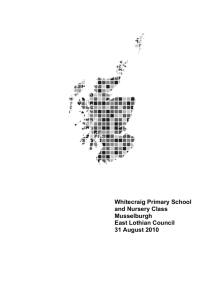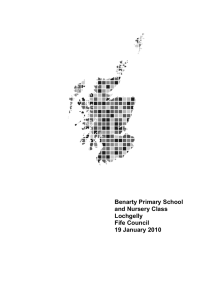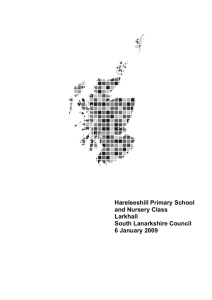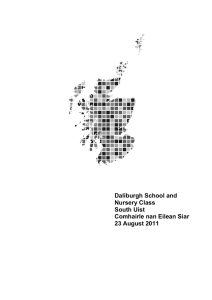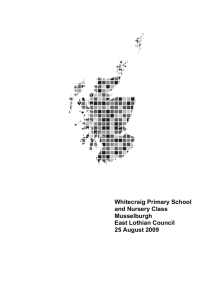Newfield Primary School and Nursery Class Stonehouse
advertisement
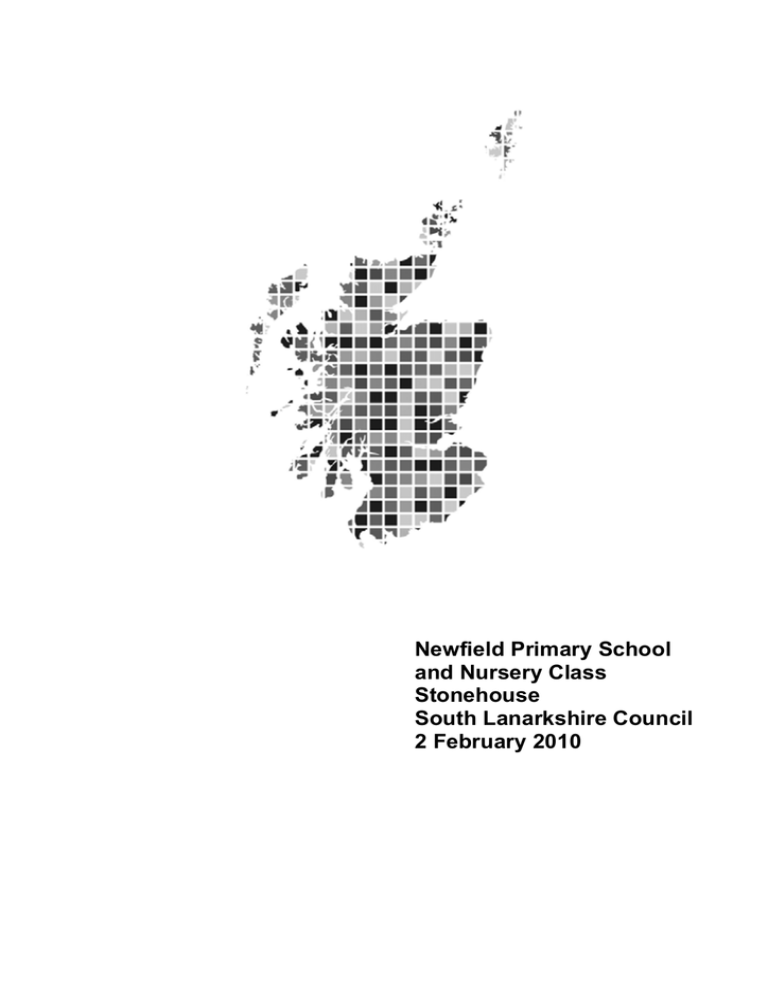
Newfield Primary School and Nursery Class Stonehouse South Lanarkshire Council 2 February 2010 HM Inspectorate of Education (HMIE) inspects schools in order to let parents1, children and the local community know whether their school2 provides a good education. Inspectors also discuss with school staff how they can improve the quality of education. At the beginning of the inspection, we ask the headteacher and staff about the strengths of the school, what needs to improve, and how they know. We use the information they give us to help us plan what we are going to look at. During the inspection, we go into classes and join other activities in which children are involved. We also gather the views of children, parents, staff and members of the local community. We find their views very helpful and use them together with the other information we have collected to arrive at our view of the quality of education. This report tells you what we found during the inspection and the quality of education in the school. We describe how well children are doing, how good the school is at helping them to learn and how well it cares for them. We comment on how well staff, parents and children work together and how they go about improving the school. We also comment on how well the school works with other groups in the community, including services which support children. Finally, we focus on how well the school is led and how staff help the school achieve its aims. If you would like to learn more about our inspection of the school, please visit www.hmie.gov.uk. Here you can find analyses of questionnaire returns from children, parents and staff. We will not provide questionnaire analyses where the numbers of returns are so small that they could identify individuals. Where applicable, you will also be able to find descriptions of good practice in the school. 1 Throughout this report, the term ‘parents’ should be taken to include foster carers, residential care staff and carers who are relatives or friends. 2 The term ‘school’ includes the nursery class or classes where appropriate. Contents 1. The school 2. Particular strengths of the school 3. Examples of good practice 4. How well do children learn and achieve? 5. How well do staff work with others to support children’s learning? 6. Are staff and children actively involved in improving their school community? 7. Does the school have high expectations of all children? 8. Does the school have a clear sense of direction? 9. What happens next? 1. The school Newfield Primary School is a non-denominational school with a nursery class. It serves an area to the west of Stonehouse. The roll was 232, including 28 in the nursery, when the inspection was carried out in November 2009. Children’s attendance was in line with the national average in 2007/2008. 1 2. Particular strengths of the school • Children are kind, respectful and keen to learn. • Children’s knowledge and skills in environmental and health education. • Partnerships with parents and the community. • The effectiveness of the depute headteacher in improving support for children with additional learning needs. • The headteacher and staff team’s skill and success in providing a safe and nurturing environment for learning. 3. Examples of good practice • Creating a new vision statement. • Using social enterprise projects to develop citizenship skills. 4. How well do children learn and achieve? Learning and achievement Children in the nursery are happy and familiar with daily routines such as snack time. Most are developing friendships with other children. The majority concentrate well when involved in activities such as construction. A few need more help and encouragement to try out different activities. Children enjoy outdoor play but they would benefit 2 from a wider range of experiences and choice when learning outdoors. In the primary classes children are kind, respectful of each other and keen to learn. Younger children find active learning experiences fun. Children take responsibility for some aspects of their learning but would benefit from more involvement in planning and leading their own learning. Across the school, children are developing well their skills in teamwork. They value the opportunities they have to take responsibility for aspects of the school’s work. Children are well mannered and are making effective contributions as responsible members of their school community. The school organises, for example, many events each year in support of local and international charities. Children know what they need to do to keep healthy. Many take part successfully in a good range of out-of-school clubs and activities. They perform confidently in school shows, including the very successful show for the school’s 30th birthday. Children in the nursery class are making progress in their learning and development. The majority experiment well with early drawing and writing. Almost all can recognise their names in print. They need more opportunities to explore letters and sounds. The majority are gaining early mathematics skills, including counting and awareness of space and volume. As yet, children do not take part in a wide enough range of challenging mathematical experiences. At the primary stages, most children attain appropriate national levels in English language and mathematics. In recent years, the school has improved standards in writing and mathematics. Standards in reading have been more variable. In English language, children listen very well to instructions and to each other in small and larger groups. Almost all children can speak confidently to an audience and most are able to articulate well their thoughts and opinions. Children enjoy reading both for pleasure and to find information. Children’s writing is very well presented. Children write for a variety of purposes and many write interesting stories. Some are capable of writing longer pieces of work. Contexts for writing are not always stimulating or meaningful. In mathematics, almost all children can carry out mental and written 3 calculations accurately. Children can create displays of information and understand shapes. Children have regular access to information and communications technology (ICT), which most use well to extend their mathematical skills and for problem solving. Curriculum and meeting learning needs In the nursery and primary classes, staff organise a broad and balanced curriculum. Staff are beginning to take account of aspects of the national initiative, Curriculum for Excellence. They have made a positive start to planning more active learning experiences for children and making connections across subjects such as mathematics and health education. Staff make effective use of visits, including residential trips, to extend children’s learning. They have successfully developed children’s knowledge and skills in environmental and health education through the Eco-Schools Scotland and health promoting school initiatives. All classes have two hours of good quality physical education each week. In English language and mathematics, teachers need to rely less on textbook activities and also be more creative in planning stimulating learning activities for children. In the nursery class, staff are caring and they ensure children’s emotional needs are met well. They plan play activities which meet the needs of the majority of children. Staff need to improve the way they gather information about how well children are learning. Some children are not sufficiently challenged to extend their thinking and learn new skills. In the primary classes, staff have improved the way they identify and support children who need additional help with their learning. As a result, children who need extra help receive well-judged support from teachers, classroom assistants and visiting professionals. The depute headteacher records the progress of individuals carefully and involves parents and other agencies as required. The positive benefits to individual children are clear. Teachers are well organised. They have started to improve their range of teaching approaches and are getting better at sharing with children what they expect them to learn. At some stages, class teachers need to adjust the tasks and the rate at which children learn to suit better children’s differing styles of 4 learning. Some work is too easy for higher-achieving children. Teachers set homework tasks regularly for reading, spelling and mathematics. 5. How well do staff work with others to support children’s learning? Staff have close and productive links with a wide range of agencies to support children and their families. The school has been very successful in developing positive relationships with parents and the local community. Parents receive regular information from the school, including the school’s website. They are kept well informed about the work of the school. Annual written reports outline how well their children are progressing in learning. In the foyer, parents and others can watch lively media presentations of school shows and other events. Parents regularly assist teachers in classes. They value this type of involvement in their children’s learning. The active Parent Council communicates often with parents on matters relating to the school and community. It has been closely involved in reviewing the school’s vision statement and in the planning of the new school building. The school has consulted parents on its programme and resources for sensitive areas of health. The school deals effectively with the very few concerns or complaints raised by parents. Children and parents benefit from the school’s effective arrangements for moving from nursery to P1 and from P7 to Larkhall Academy. Older children produced a DVD, to help parents and nursery children learn more about what happens in P1. 6. Are staff and children actively involved in improving their school community? Children respond positively to the increasing opportunities they have to improve their school community. Their involvement in creating the school motto, ‘growing into excellence’, has helped improve attitudes to learning. Children have successfully reduced the amount of energy 5 used by the school through activities such as switching off lights when they are not needed. They are rightly proud of their permanent Eco-Schools Scotland green flag and gold award for health promotion. They have supported community fly-tipping issues and worked with staff in a residential home for the elderly to produce a newsletter. Staff have been more involved in school improvement, taking on responsibility for improving learning. As a result, they are getting better at reflecting on their own practice. Teachers would benefit from more opportunities to share and view best practice. The school improvement plan has had a positive impact on some aspects of the work of the school. There is scope to improve further the rigour of the school’s approaches for monitoring and evaluating the quality of its work. The school’s arrangements for tracking children’s attainment need to be reviewed in line with Curriculum for Excellence. 7. Does the school have high expectations of all children? Relationships between staff and children are very strong and are founded on mutual trust and respect. Staff have a good understanding of child protection procedures. Children’s achievements are regularly praised and celebrated in classes and in school assemblies. Staff make good use of displays and the school newsletter to highlight good work and children’s success in activities in and out of school. They have high expectations of children’s attendance in school and take appropriate action to improve attendance when required. Staff need to raise even further their expectations of children’s achievement. Children’s behaviour is exemplary. There are appropriate opportunities for children to learn about other beliefs and cultures and about discrimination. Children have a good understanding of equality and gender issues. 8. Does the school have a clear sense of direction? The headteacher and staff have successfully created a safe and nurturing environment. The headteacher is held in very high regard. 6 Her calm and sensitive leadership is valued by staff. Staff have responded positively to opportunities to lead school improvement. They are keen to improve further their active approaches to learning and teaching. The school’s vision and values were recently revised in consultation with children, parents and staff. The depute headteacher ably supports the headteacher and staff. She has improved aspects of the work of the school, including support for learning arrangements. The principal teacher is developing well the school’s use of ICT. The school improvement plan contains relevant areas for improvement. Some of these areas have been taken forward successfully. However, the school needs to adopt a more thorough approach to evaluating the quality of its work. Senior staff are well placed to lead these improvements and to improve further the quality of education. 9. What happens next? We are confident that, with support from the education authority, the school will be able to make the necessary improvements in light of the inspection findings. As a result, we will make no more visits in connection with this inspection. The school and the education authority will inform parents about the school's progress in improving the quality of education. We have agreed the following areas for improvement with the school and education authority. • Improve children’s learning experiences in the nursery class through more effective planning, assessment and tracking of children’s learning. • Improve arrangements for self-evaluation and monitoring children’s progress to ensure consistently high-quality learning and teaching and increased impact on children’s attainment. 7 At the last Care Commission inspection of the nursery class there were seven recommendations, six of which had been addressed. Outstanding issues are carried forward in this report. Quality indicators help schools and nursery classes, education authorities and inspectors to judge what is good and what needs to be improved in the work of a school and a nursery class. You can find these quality indicators in the HMIE publications How good is our school? and The Child at the Centre. Following the inspection of each school, the Scottish Government gathers evaluations of three important quality indicators to keep track of how well all Scottish schools and nursery classes are doing. Here are the evaluations for Newfield Primary School and Nursery Class. Primary school Improvements in performance Learners’ experiences Meeting learning needs good good good Nursery class Improvements in performance Children’s experiences Meeting learning needs satisfactory satisfactory satisfactory We also evaluated the following aspects of the work of the school and nursery class. The curriculum Improvement through self-evaluation HM Inspector: Marion A Burns 2 February 2010 8 good satisfactory When we write reports, we use the following word scale so that our readers can see clearly what our judgments mean. excellent very good good means means means satisfactory weak unsatisfactory means means means outstanding, sector leading major strengths important strengths with some areas for improvement strengths just outweigh weaknesses important weaknesses major weaknesses If you would like to find out more about our inspections or get an electronic copy of this report, please go to www.hmie.gov.uk. Please contact us if you want to know how to get the report in a different format, for example, in a translation, or if you wish to comment about any aspect of our inspections. You can contact us at HMIEenquiries@hmie.gsi.gov.uk or write to us at BMCT, HM Inspectorate of Education, Denholm House, Almondvale Business Park, Almondvale Way, Livingston EH54 6GA. Text phone users can contact us on 01506 600 236. This is a service for deaf users. Please do not use this number for voice calls as the line will not connect you to a member of staff. You can find our complaints procedure on our website www.hmie.gov.uk or alternatively you can contact our Complaints Manager, at the address above or by telephoning 01506 600259. Where the school has a nursery class, you can contact the Complaints Coordinator, Headquarters, Care Commission, Compass House, Riverside Drive, Dundee DD1 4NY, telephone 0845 603 0890. Crown Copyright 2010 HM Inspectorate of Education
